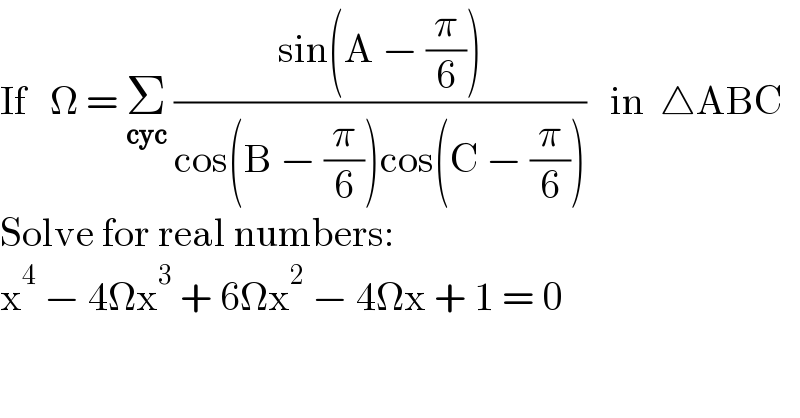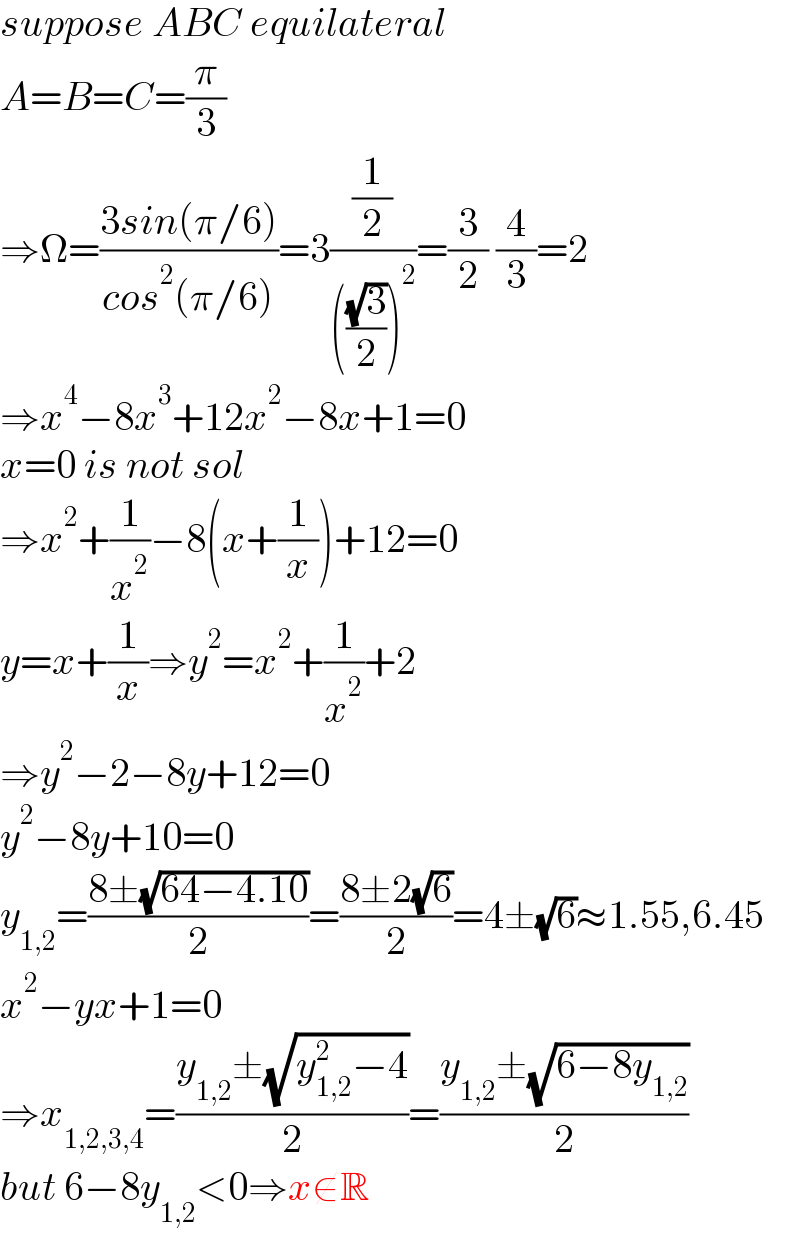
Question Number 188226 by Shrinava last updated on 26/Feb/23

$$\mathrm{If}\:\:\:\Omega\:=\:\underset{\boldsymbol{\mathrm{cyc}}} {\sum}\:\frac{\mathrm{sin}\left(\mathrm{A}\:−\:\frac{\pi}{\mathrm{6}}\right)}{\mathrm{cos}\left(\mathrm{B}\:−\:\frac{\pi}{\mathrm{6}}\right)\mathrm{cos}\left(\mathrm{C}\:−\:\frac{\pi}{\mathrm{6}}\right)}\:\:\:\mathrm{in}\:\:\bigtriangleup\mathrm{ABC} \\ $$$$\mathrm{Solve}\:\mathrm{for}\:\mathrm{real}\:\mathrm{numbers}: \\ $$$$\mathrm{x}^{\mathrm{4}} \:−\:\mathrm{4}\Omega\mathrm{x}^{\mathrm{3}} \:+\:\mathrm{6}\Omega\mathrm{x}^{\mathrm{2}} \:−\:\mathrm{4}\Omega\mathrm{x}\:+\:\mathrm{1}\:=\:\mathrm{0} \\ $$
Answered by aleks041103 last updated on 27/Feb/23

$${suppose}\:{ABC}\:{equilateral} \\ $$$${A}={B}={C}=\frac{\pi}{\mathrm{3}} \\ $$$$\Rightarrow\Omega=\frac{\mathrm{3}{sin}\left(\pi/\mathrm{6}\right)}{{cos}^{\mathrm{2}} \left(\pi/\mathrm{6}\right)}=\mathrm{3}\frac{\frac{\mathrm{1}}{\mathrm{2}}}{\left(\frac{\sqrt{\mathrm{3}}}{\mathrm{2}}\right)^{\mathrm{2}} }=\frac{\mathrm{3}}{\mathrm{2}}\:\frac{\mathrm{4}}{\mathrm{3}}=\mathrm{2} \\ $$$$\Rightarrow{x}^{\mathrm{4}} −\mathrm{8}{x}^{\mathrm{3}} +\mathrm{12}{x}^{\mathrm{2}} −\mathrm{8}{x}+\mathrm{1}=\mathrm{0} \\ $$$${x}=\mathrm{0}\:{is}\:{not}\:{sol} \\ $$$$\Rightarrow{x}^{\mathrm{2}} +\frac{\mathrm{1}}{{x}^{\mathrm{2}} }−\mathrm{8}\left({x}+\frac{\mathrm{1}}{{x}}\right)+\mathrm{12}=\mathrm{0} \\ $$$${y}={x}+\frac{\mathrm{1}}{{x}}\Rightarrow{y}^{\mathrm{2}} ={x}^{\mathrm{2}} +\frac{\mathrm{1}}{{x}^{\mathrm{2}} }+\mathrm{2} \\ $$$$\Rightarrow{y}^{\mathrm{2}} −\mathrm{2}−\mathrm{8}{y}+\mathrm{12}=\mathrm{0} \\ $$$${y}^{\mathrm{2}} −\mathrm{8}{y}+\mathrm{10}=\mathrm{0} \\ $$$${y}_{\mathrm{1},\mathrm{2}} =\frac{\mathrm{8}\pm\sqrt{\mathrm{64}−\mathrm{4}.\mathrm{10}}}{\mathrm{2}}=\frac{\mathrm{8}\pm\mathrm{2}\sqrt{\mathrm{6}}}{\mathrm{2}}=\mathrm{4}\pm\sqrt{\mathrm{6}}\approx\mathrm{1}.\mathrm{55},\mathrm{6}.\mathrm{45} \\ $$$${x}^{\mathrm{2}} −{yx}+\mathrm{1}=\mathrm{0} \\ $$$$\Rightarrow{x}_{\mathrm{1},\mathrm{2},\mathrm{3},\mathrm{4}} =\frac{{y}_{\mathrm{1},\mathrm{2}} \pm\sqrt{{y}_{\mathrm{1},\mathrm{2}} ^{\mathrm{2}} −\mathrm{4}}}{\mathrm{2}}=\frac{{y}_{\mathrm{1},\mathrm{2}} \pm\sqrt{\mathrm{6}−\mathrm{8}{y}_{\mathrm{1},\mathrm{2}} }}{\mathrm{2}} \\ $$$${but}\:\mathrm{6}−\mathrm{8}{y}_{\mathrm{1},\mathrm{2}} <\mathrm{0}\Rightarrow{x}\notin\mathbb{R} \\ $$
Commented by Shrinava last updated on 28/Feb/23

$$\mathrm{perfect}\:\mathrm{dear}\:\mathrm{professor}\:\mathrm{thank}\:\mathrm{you} \\ $$
